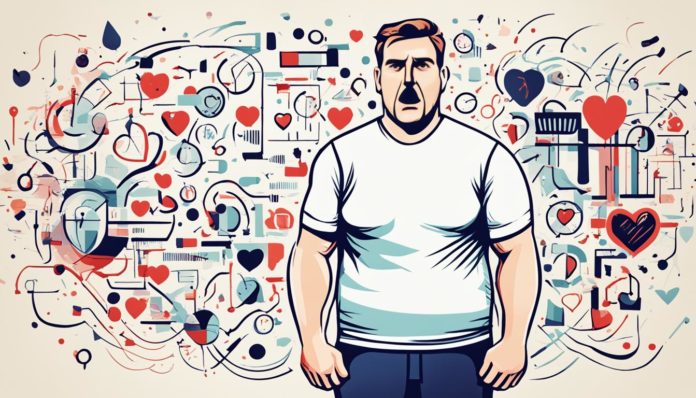Losing more than three pounds per week can increase the risk of getting gallstones. This fact highlights the dangers of losing weight too fast. It’s important to ask if such methods are safe or lasting.
Many people want to lose weight quickly, making the safety of rapid weight loss a big concern. We need to understand the health risks and if losing weight safely is possible. Rapid weight loss means losing a lot of weight in a short time, often through extreme diets or health issues.
This article will look into the reality of rapid weight loss. We’ll discuss the physical and mental health risks it can bring. Remember, health should always come first, not just a desire to be thinner.
Key Takeaways:
- Rapid Weight Loss Safety is a critical concern often overlooked in the quest for quick results.
- Understanding the various methods people use for rapid weight loss can highlight the potential health risks.
- It’s possible to achieve weight loss without compromising safety by following evidence-based recommendations.
- Health risks of rapid weight loss include physical complications like gallstones and metabolic disruptions.
- Long-term mental health effects can also arise from extreme dieting practices.
Understanding Rapid Weight Loss
When talking about quick and safe weight loss, it’s key to understand what rapid weight loss means. Experts say it’s losing more than 2-3 pounds a week. Knowing what causes this fast weight drop is vital for managing your weight well.
Definition of Rapid Weight Loss
Rapid weight loss means losing over 2-3 pounds each week. This can happen with strict diets, intense workouts, or some health issues. Health experts find this kind of loss worrying.
Common Causes of Rapid Weight Loss
Many things can lead to quick and safe weight loss. Some people try fad diets or intense exercises for fast results. Others might lose weight without trying due to stress or health problems. It’s important to find out why to take the right steps.

- Voluntary Causes: These include restrictive diets, high-intensity exercise, and specific weight loss programs targeting rapid results.
- Involuntary Causes: Factors such as severe stress, chronic illnesses, and metabolic imbalances can also lead to an unintended rapid drop in weight.
Knowing what is rapid weight loss and its causes helps people pick the best and safest ways to manage their weight.
Health Risks Associated with Rapid Weight Loss
Rapid weight loss might seem appealing for those eager to shed pounds quickly, but it comes with significant health risks. It is imperative to understand these risks to make informed decisions about weight loss methods. The health risks of rapid weight loss can have severe impacts on both physical and mental well-being.

Physical Health Consequences
The physical health consequences of rapid weight loss are numerous and can lead to serious medical conditions. Some of the most common physical risks include:
- Nutrient Deficiencies: Rapid weight loss often results from restrictive diets that fail to provide essential nutrients, leading to deficiencies in vitamins and minerals such as iron, calcium, and vitamin D.
- Gallstones: A sudden drop in weight can cause an imbalance in bile production, which increases the risk of developing painful gallstones.
- Electrolyte Imbalances: Rapid fluid loss, especially through extreme dieting or excessive exercise, can result in dangerous electrolyte imbalances. This condition may lead to heart arrhythmias, muscle cramps, and overall weakness.
Mental Health Implications
In addition to physical health risks, rapid weight loss can also negatively impact mental health. Some of the mental health risks include:
- Body Image Issues: Rapid weight loss can exacerbate pre-existing body image problems or create new ones, resulting in anxiety and depression.
- Development of Eating Disorders: The pressure to lose weight quickly can lead to harmful eating behaviors and the onset of eating disorders like anorexia or bulimia.
- Mental Strain: Maintaining an unsustainable diet can cause significant mental stress, which might contribute to emotional instability and decrease overall quality of life.
| Physical Health Risks | Mental Health Risks |
|---|---|
| Nutrient Deficiencies | Body Image Issues |
| Gallstones | Development of Eating Disorders |
| Electrolyte Imbalances | Mental Strain |
Considering these physical and mental health risks, it is vital to approach weight loss with a focus on sustainability and overall well-being rather than opting for rapid methods that might cause more harm than good.
Rapid Weight Loss Safety
When you want to lose weight fast, think about how it affects your health. Losing pounds quickly sounds good, but there are risks you should know about.
Dangers of Extreme Dieting
Extreme dieting means eating very few calories and cutting out big food groups. This can cause health problems. It leads to not getting enough nutrients and can mess with your metabolism.
Being on a strict diet can hurt your mental health too. You might feel anxious, have mood swings, and think about food too much. These diets often don’t work long-term, leading to a cycle of losing and gaining weight. This can hurt your self-esteem and mental health.
Impact on Metabolism
The rapid weight loss metabolic effects are important to know. Losing weight fast can change how many calories your body burns at rest. Your body might slow down your metabolism to save energy.
This slowdown makes it hard to keep weight off. Your body starts storing more fat, which can stop you from losing weight. This is tough for people who lose weight quickly but then hit a plateau or gain it back.
| Risk | Description |
|---|---|
| Nutritional Deficiencies | Lack of essential vitamins and minerals needed for proper body function. |
| Metabolic Slowdown | Lowering of basal metabolic rate, making future weight maintenance challenging. |
| Mental Health Issues | Anxiety, mood swings, and potential development of eating disorders. |
Safe Weight Loss Methods
Choosing safe ways to lose weight is key for a healthy lifestyle. It means eating well and exercising regularly for lasting results.
Balanced Diet Approaches
A balanced diet for losing weight includes many food groups for good nutrition. Important parts are:
- Fruits and Vegetables: Full of vitamins, minerals, and antioxidants.
- Lean Proteins: Needed for fixing and growing muscles, like chicken, fish, and beans.
- Whole Grains: Give you energy and fiber, such as oats, quinoa, and brown rice.
- Healthy Fats: Crucial for brain health and feeling full, including avocados, nuts, and olive oil.
- Hydration: Drinking lots of water helps with digestion and health.
Importance of Regular Exercise
Adding exercise and weight loss plans makes losing weight better. Working out helps burn calories, build muscle, and boost heart health.
- Cardiovascular Exercises: Running, cycling, and swimming burn calories and keep the heart healthy.
- Strength Training: Lifting weights and doing bodyweight exercises keeps and grows muscle.
- Flexibility and Balance: Yoga and Pilates make you more flexible and lower injury risk.
Together, eating well and exercising helps manage weight in a full way. It keeps you healthy in body and mind.
Healthy Weight Loss Tips
On your path to a healthier life, it’s key to use effective strategies for lasting results. Mixing different methods can keep you motivated and help you see your progress.
Setting Realistic Goals
It’s vital to set goals you can really reach for lasting success. Goals that are too high can make you feel stuck and might make you quit. Start by looking at your current habits, how active you are, and what you eat. Set goals that push you but are still within reach, like losing 1-2 pounds a week.
Break your goals into smaller steps for each week or month. This way, you’ll feel like you’re winning and will keep moving forward. Make sure your goals include big targets and smaller ones to stay motivated and interested.
Tracking Progress
Keeping an eye on your weight loss journey is key to staying motivated and tweaking your plan. Here are some ways to track your progress well:
- Apps: Use apps like MyFitnessPal or Lose It! to track what you eat, your workouts, and your weight.
- Food Diaries: Writing down what you eat can show you what patterns you have and where you can get better.
- Regular Check-ins: Meet with a doctor now and then to check on your progress and adjust your plan as needed.
Watching your weight loss isn’t just about the number on the scale. It’s also about feeling better, being stronger, and feeling well overall. Keeping track of your progress lets you celebrate your wins and fix any problems fast.
Effective Weight Loss Strategies
Adding effective weight loss strategies to your life can lead to healthy and lasting weight loss. A key step is planning your meals well. This means picking healthy foods and eating at the right times to boost your metabolism and energy.
Changing your behavior is vital for lasting results. This includes eating mindfully, like not eating in front of the TV and listening to your body’s hunger signals. Also, lowering stress can help with weight loss since stress often leads to poor eating habits.
Changing your lifestyle fully is another key to losing weight well. This means being active, getting enough sleep, and drinking plenty of water. These habits help with weight loss and make you feel better overall.
Sticking to sustainable weight loss methods means focusing on both short and long-term goals. Setting achievable goals makes your journey easier and more inspiring. Getting support from friends or a professional can also help, offering encouragement and advice.
- Plan balanced, nutritious meals
- Embrace mindful eating habits
- Incorporate regular exercise
- Maintain adequate hydration and sleep
- Set and track realistic weight loss goals
- Seek social support and professional advice
Remember, when trying effective weight loss strategies, being consistent and persistent is crucial. By choosing sustainable methods, you’re setting yourself up for lasting health gains and a better life.
Best Practices for Losing Weight Safely
For those wanting to lose weight safely, it’s key to follow effective and safe strategies. We’ll talk about avoiding fad diets and why getting professional advice is crucial.
Avoiding Fad Diets
Fad diets promise quick weight loss but can be harmful to your health. They often lack scientific support and may cause nutrient shortages. To lose weight safely, avoid these diets and eat balanced, nutrient-rich foods instead.
Professional Guidance
Getting advice from health experts can greatly improve your chances of losing weight. Dietitians and nutritionists create plans that fit your specific needs. They help you stay on track, adjust your plan as needed, and aim for sustainable health goals.
| Approach | Advantages | Disadvantages |
|---|---|---|
| Fad Diets | Quick initial weight loss | Lack of sustainability, potential nutrient deficiencies, health risks |
| Professional Guidance | Personalized plans, long-term success, health safety | Requires commitment and possible costs |
Safe Ways to Lose Weight Fast
Finding safe ways to lose weight quickly means using smart strategies. This includes staying hydrated and getting enough sleep. These basics can greatly improve weight loss and keep you healthy.
Hydration and its Role
Drinking enough water is key for losing weight. It helps your metabolism and controls your hunger. Experts say you should drink at least 8 glasses of water a day.
Being well-hydrated also helps you not eat when you’re not hungry. This can cut down on snacking and help you lose weight better.
Sleep and Weight Loss
Getting enough sleep is also important for losing weight safely. Sleep affects hunger and metabolism hormones. Not sleeping enough can make you eat more and slow down your metabolism.
Try to get 7-9 hours of good sleep each night. This keeps your hormones balanced and helps with weight control. Good sleep is good for your body and mind, making weight loss easier.
Achieving Rapid Weight Loss without Compromising Safety
Many people want to lose weight fast, but it’s key to keep safety in mind. We must watch our nutrient intake and not overtrain.
Monitoring Nutrient Intake
For safe rapid weight loss, eating a balanced diet is crucial. This diet should give the body all the nutrients it needs. Eating lots of fruits, veggies, lean meats, and whole grains helps with weight loss and keeps you healthy.
Avoiding Overtraining
Too much exercise can lead to injuries, being too tired, and even harm your metabolism. Exercise is good for losing weight, but don’t do too much. Doing moderate exercise and resting enough helps you lose weight safely. Overdoing it can stop your weight loss, make you feel burnt out, and increase the chance of getting hurt.
Conclusion
Rapid weight loss might seem appealing but it’s not good for your health. It can lead to serious health issues. The key is to focus on safe and sustainable weight loss to avoid health problems.
It’s important to choose weight loss methods supported by science. Eating well, exercising regularly, staying hydrated, and getting enough sleep are key. These habits help you lose weight safely and keep it off. For more information on how different weight loss rates affect your body, check out this study.
Reaching and keeping a healthy weight should be a personal journey. It should be based on solid research. By focusing on safe weight loss, you can meet your goals without harming your health. Getting help from professionals and avoiding extreme diets are key to long-term success.
FAQ
Is rapid weight loss safe?
Rapid weight loss can be risky, leading to nutrient shortages, gallstones, and losing muscle too fast. It’s key to lose weight safely by following doctor-approved methods.
What is considered rapid weight loss?
Losing more than 2-3 pounds a week is seen as rapid weight loss. This quick pace can harm the body and isn’t sustainable over time.
What are some common causes of rapid weight loss?
Causes include extreme diets, intense workouts, health issues, and high stress. Knowing the cause helps pick safe ways to manage weight.
What are the physical health risks of rapid weight loss?
Risks include losing electrolytes, muscles, feeling tired, lacking nutrients, and a higher chance of getting gallstones. These issues can make keeping weight off hard.
What mental health issues can arise from rapid weight loss?
Issues include eating disorders, body image problems, anxiety, and depression. The push for quick results can really hurt mental health.
What are the dangers of extreme dieting?
It can cause severe nutrient shortages, weaken the immune system, mess with metabolism, and lead to unhealthy food habits. It’s better to choose balanced diets for losing weight.
How does rapid weight loss affect metabolism?
It can slow down your metabolism, making it tough to keep weight off. This can lead to a cycle of gaining weight and dieting, which is bad for you.
What are some safe weight loss methods?
Safe methods include eating a balanced diet and staying active. Slow, steady weight loss is better for your health in the long run.
Why is setting realistic weight loss goals important?
Realistic goals keep you motivated and prevent feeling discouraged. Achievable goals help you stick with healthy habits, making weight loss more likely to succeed.
How can tracking progress aid in weight loss?
Tracking progress keeps you motivated and lets you make changes as needed. Tools like apps and food diaries help you stay on track and check your progress.
What are some effective weight loss strategies?
Good strategies include planning meals, changing your habits, and making lifestyle changes. Focus on meeting your nutritional needs while eating less to lose weight safely.
How can one avoid fad diets when trying to lose weight?
Avoid fad diets by choosing diets backed by science and eating foods full of nutrients. Talk to dietitians and nutritionists to get a safe and effective weight loss plan.
Why is professional guidance important in weight loss?
Professional advice ensures you’re losing weight safely and effectively. Experts can give personalized tips, track your progress, and adjust your plan for long-term health and success.
How does hydration influence weight loss?
Drinking enough water helps control your metabolism and hunger. It’s key for losing weight and keeping your body working right.
What is the role of sleep in weight loss?
Good sleep affects hunger and metabolism hormones. Getting enough rest helps with weight loss by balancing hormones, stopping overeating, and letting your body recover from exercise.
How can one achieve rapid weight loss safely?
For safe rapid weight loss, watch your nutrient intake and eat a balanced diet. Avoid overtraining to prevent injuries and metabolic problems. Getting help from a professional is a good idea.


